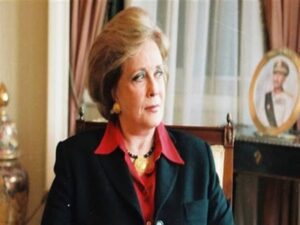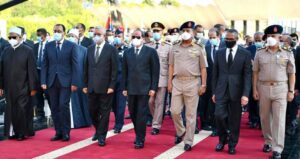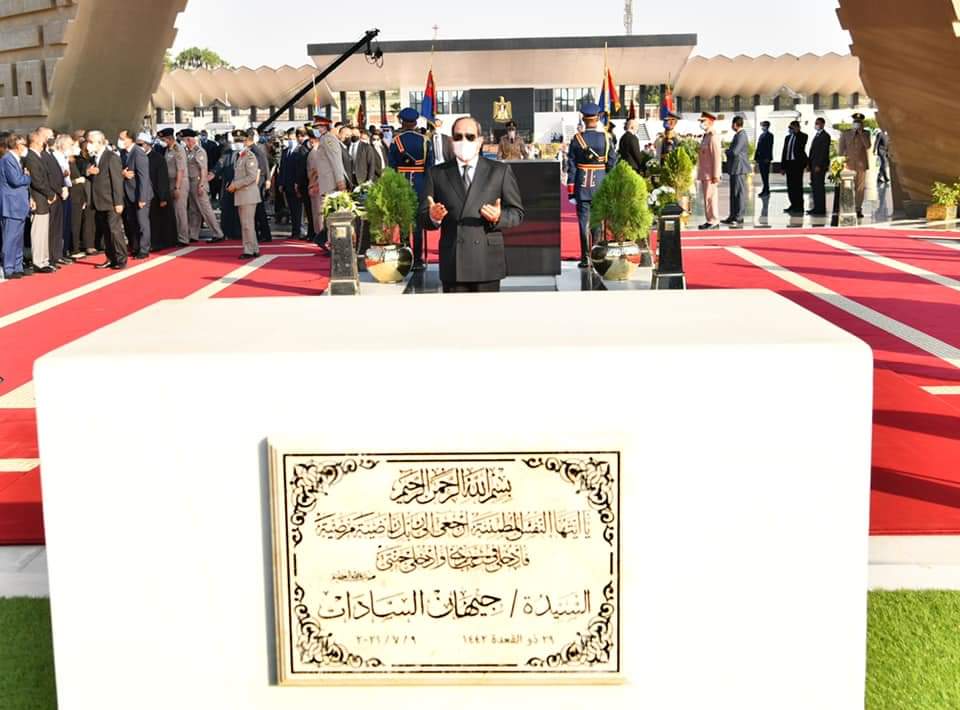Egyptian President Abdel Fattah el Sisi and First Lady Entissar el Sisi Friday led the funeral cortege of Jehan el-Sadat, the wife of Egypt’s late president, Anwar el-Sadat, who passed away earlier.

A military funeral was organised for the former Egyptian first lady near the Unknown Soldier Memorial in Nasr city, where President Sadat was assassinated during a military parade in October 1981.
Minister of Defense Mohamed Zaki and high-ranking army officers attended the funeral.
The presidency mourned Mrs Sadat earlier Friday, saying the former first lady was a brilliant example of Egyptian women who stand by their husband at the most difficult times.
Mrs Sisi also mourned Mrs Sadat, noting on Facebook that the former first lady had sacrificed everything for the best interests of her country.

President Sisi had granted Mrs Sadat, 87, the Order of the Virtues and named the Ferdous Road Axis, a main road in Cairo, after her.
Mrs Sadat was hospitalised a few days ago for a new episode in her long struggle with cancer.
She received medical treatment in the United States last year.
She was born in Cairo in August 1933 to a middle-class Egyptian father and a British mother.
In 1949, at age 15, she married Anwar el-Sadat, a military officer at the time who later served as Egypt’s president from 1970 until his assassination by Islamic terrorists in 1981.
During her husband’s tenure, Mrs Sadat established herself as a staunch advocate of women’s rights by pushing for a set of laws that granted women the right to alimony and custody of children in the case of divorce.
She also made headlines with her volunteer work and charity activities.
Her high visibility in the 1970s drew criticism from observers who accused her of exploiting her husband’s position to gain political leverage for herself.
She also presided over several national relief agencies, including the Egyptian Red Crescent, the country’s blood bank and the Egyptian Society for Cancer Patients.
During Egypt’s 1973 war with Israel, photographs of her visiting the wounded made the front pages of the national dailies.
In 1972, she established the Wafa’ Wal Amal (Faith and Hope) Society, which now operates a fully integrated community for handicapped war veterans and civilians. In 1997, she created an endowment for the Anwar Sadat Chair for Peace and Development at the University of Maryland in memory of her husband.
On the chair’s website, she is quoted as saying: “I never again want to see the face of a starving child or hear the weeping of a mother who has lost her son to war. Peace, this is what my husband gave his life for, and I want the world to know that he did not die in vain. Peace, this is what will make me very happy.”
In 1977, she graduated with a BA in Arabic literature from Cairo University. In 1986, she completed her PhD in comparative literature at the same university.
She authored two books: her autobiography A Woman of Egypt and My Hope for Peace, about the Arab-Israeli conflict and the rise of Islamic extremism. She also served as a visiting instructor at several American universities, including the University of South Carolina, Radford University and the University of Maryland.
Mrs Sadat is survived by her son, Gamal, and three daughters.





Discussion about this post